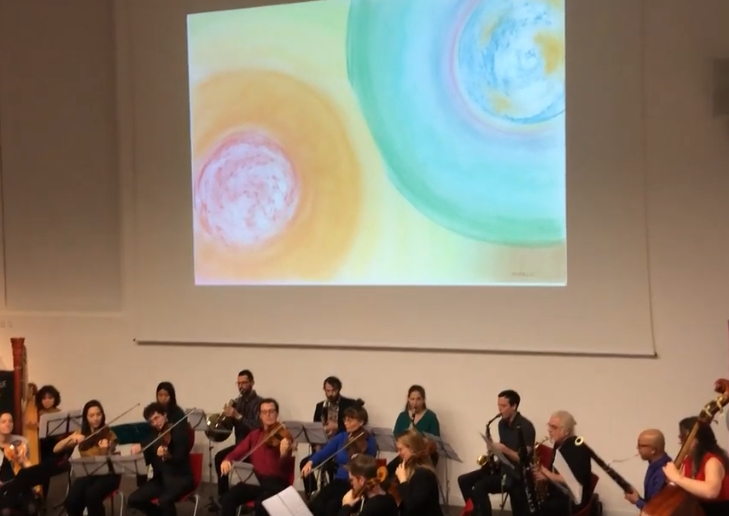 |
| May 2020 Volume 9 Issue 2 |

Being a seismologist at IPGP with its first seismometer SEIS on the red planet for the NASA InSight project (led by Philippe Lognonné), I am actively involved in the project to analyze marsquake seismograms. During a science team meeting in Pasadena just after the landing (November 26th, 2018 my birthday!), we were impressed by a video made by Andrew Huang who started to make music on instrumental noise sent from Mars. At the end of my talk, I said “challenge accepted” and promised to write a small music for the upcoming science team meeting in Paris on June 2019 featuring the seismic noise from Mars. InSight Suite No. 0 or later the third movement Seismic noise on Mars of the symphonic poem was recorded during the Paris Internationale Festival 2019 (thanks to Performance Agency Production). Subsequently, I asked Thomas Ferrand (UCSD postdoc and professional poet) and Pauline Bonnet (IPGP PhD candidate) to write poems for InSight. These became the second movement, Poems that Vibrate, Pauline and Thomas, of my symphonic poem - the first classic music on martian seismology! The first movement Pictures of Dream is accompanied by images drawn during several famous Friday beer ateliers in IPGP, organized by Aurélie Coudurier. The first full performance took place Fall 2019.
See the full article to find out how to participate in the sing-along.
contributed by
Nobuaki Fuji, Université de Paris, Institut de physique du globe de Paris
This quarter's Research Highlight reminds us that we are not just scientists - we are artists, runners, cooks, adventurers, ... the list is endless. In the year since the passing of Louise K., I reflect on her passion for the arts and especially dance in her collaboration that integrated data and software into an award winning dance production, Collapse. Many of us, like Louise, have many interests and diverse connections that will carry us through this strange time.
So much has changed in the past months. In early March at HQ, we were busy preparing for a summer of travel and looking forward to reconnecting with many of you at workshops around the world. Working with a community adept at virtual collaborations has made the transition to remote work straightforward but requires more care to maintain a healthy work-life balance. If you feel the need to stay more connected, using the CIG forums is one way to stay in touch with your geodynamics communities. Or try a quick video call to break-up the day - people are oddly available.
During this time we have worked with our workshop leaders to reschedule or reformat events. Early registrations have exceeded expectations for our 2-week series of virtual tectonics meetings featuring a hands-on modeling tutorial in week 1 and science workshop in week 2. We are excited to be able to meet this demand and accommodate a larger and more international group of participants. The 22 hour span in time zones will be challenging! The PyLith Hack and SPECFEM Developers' Workshop will be postponed until 2021, and a Rayleigh Hack is still under discussion. The ASPECT Hack organizers have modified the event dates for our first virtual hackathon. Look for more details soon. Lastly, I hope with a strong adoption and practice of recommended public health measures, we will be able to see many of you at the CIG Community Workshop in October and gather your input for the next phase of CIG.
In the meantime, I look forward to connecting with you at one of our virtual events this summer or simply over virtual coffee and porch sitting.
Contributing software for use by the geodynamics community has just gotten easier. Accompanying CIG's Code Donation Policy and Software Best Practices is our new Software Checklist. The checklist aims to take the guesswork out of how to apply our best practices. A sample repo (repository template) and all of our best practices can be found in our github best practices repository. Create an issue or pull request to contribute to the conversation on best practices to improve our software community.
Congratulations to Ebru Bozdag, Colorado School of Mines, recipient of a 2020 NSF CAREER award to improve seismic images of Earth's deep interior. [press release]
Congratulations to our 2020-2021 CIG Distinguished Speakers:
We look forward to increasing the awareness of careers in computation and creating connections to broader STEM communities and more diverse audiences. If you are interested in hosting a speaker, please send your request by the deadline. More information can be found on our website. Deadline is May 31, 2020. [info] [apply]
CIG tracks a minimal amount of information on the users of its website and event participants. Our new privacy policy covers the information we collect but does not cover the third party websites we use. Check out our full privacy policy to learn more.
| May 14 | Rene Gassmoeller, CIG UC Davis.
Discovering and addressing social challenges during the evolution of scientific software projects.
|